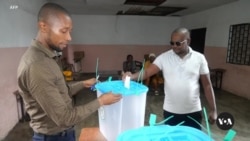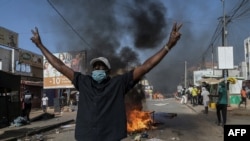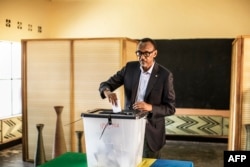The democratic process in sub-Saharan Africa is not off to a good start in what is supposed to be a busy election year.
The small island nation of Comoros was the first to host presidential elections in 2024. Incumbent president Azali Assoumani - a former military officer who first came to power in a coup in 1999 - won a fourth term.
Sahel Region
Election results were immediately rejected by the opposition, triggering violent protests that killed one and injured 25.
Next on the list was supposed to be Mali, followed by Senegal, but elections were postponed in both countries. Mali is ruled by Assimi Goita and right? a military junta that overthrew a democratically elected government in 2020.
At the time, Goita promised to return the country to civilian rule but eventually had a second coup months later, forcing out the chosen transitional civilian leaders.
Edgar Githua of the United States International University-Africa told VOA OK? that elections may not take place in Sahel countries that have recently experienced coups.
"Burkina Faso, Mali, Niger, have promised they are going to transition, they will not ... All these military juntas are trained military soldiers, they do not know how to govern. The learning curve to learn how to govern is too long.”
Earlier this month, in an unprecedented move, Senegalese President Macky Sall announced that elections will be delayed because of allegations of corruption in election-related cases and the disqualification of some leading candidates.
Some in the opposition called the delay a constitutional coup, though in July, Sall said he would not seek a third term after deadly clashes protesting his possible run for another term.
Lloyd Kuveya, of the University of Pretoria law school in South Africa told VOA it seems like Sall wants to stay a little longer.
“Can we really trust Macky Sall? Everybody knows that his intentions were going for a third term, and if it hadn’t been for the protests of the people of Senegal, I am quite sure he would’ve gone ahead to change the constitution.”
On Thursday, Senegal's top election authority, the constitutional council, ruled that delaying the elections was not in line with the constitution. It is not clear if elections will still be held as previously planned on February 25, as many candidates had suspended their campaigning due to the postponement.
Senegal has been seen as a beacon of democracy in a region plagued by coups as Momadou Thior, Senegalese journalist and political analyst recently told VOA.
“We witnessed, in 2000, the first change in power with the opposition leader then named Abdoulaye Wade defeating the incumbent President [Abdou] Diouf, who was in power for 20 years, and 12 years later, the current president, Macky Sall, defeating the same Abdoulaye Wade after 12 years in power.”
East Africa
In East Africa, Rwanda has had the same president since 2000. While some analysts credit Paul Kagame for bringing unity and economic development to Rwanda after the country’s OK? genocide, others question his popularity within the country.
"Rwanda is the paradox of Africa. Paradox of Africa because the Rwandese themselves are afraid to talk about their own elections. If you have a vote where 98% votes for one candidate, that is a red flag. Nobody is that popular in this world," Githua said.
He said Kagame will once again win the elections with over 90% of the vote in his favor but said he is more worried about the post-Kagame era.
“Rwandese democracy is not mature because we've had some very negative experiences of past leaders who've tried to run against Kagame, the system kind of muzzles them. ...The bigger question for me in Rwanda is not even the elections they will have right now. Are they ready for that political landscape if Paul Kagame says he's walking away?”
A 2022 Human Rights Watch report said the space for political opposition, civil society, and media remained closed in Rwanda.
Southern Africa
In South Africa, the African National Congress has been governing since 1994, when Nelson Mandela was elected president following the end of apartheid in the early 1990s, but there may not be business as usual, Kuveya says.
“The ANC will win the elections but not with an outright majority. It’ll be below 50[%],OK? and therefore, the African National Congress must brace for coalition politics although they are saying there will never be [a] coalition, they are going to win outright.”
He said allegations of corruption, scandals, and disunity within the ANC – as former president Jacob Zuma recently said he will vote for a different party - are already helping the opposition, including the Economic Freedom Fighters party led by Julius Malema, a former ANC youth leader.












